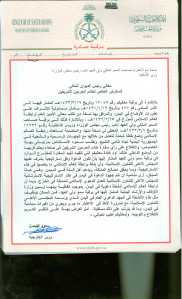The below Saudi cable, labeled as classified, describes a meeting in 2011 between controversial political figure Tawakol Karman and the Saudi representative to the UN. The letter states that the meeting was arranged at her request.
Karman, a Nobel peace prize laureate and member of Yemen’s al-Islah party (an alliance of Muslim Brotherhood, radical Islamists, tribal personalities, and businessmen), was among the revolutionaries who came together in 2011 to demand the old regime’s ouster. Up until about a year ago, she was sharply critical of Saudi Arabia and its interference in Yemen’s domestic affairs, and wrote praising the Qatari regime. (The two countries have competed for greater influence in the region). In the below Facebook post for example, she denounces the Kingdom for stealing Yemen’s oil. She belittles the royal family with the hashtag “al Cobra,” or snake in English.
 Yet the 2011 cable below reveals that while she was publicly denouncing the Kingdom for interfering in Yemen’s affairs, she was secretly arranging meetings with the Saudis to request their support.
Yet the 2011 cable below reveals that while she was publicly denouncing the Kingdom for interfering in Yemen’s affairs, she was secretly arranging meetings with the Saudis to request their support.
During the meeting described in the letter, Karman lavished praise on the Kingdom for pushing through a transition agreement that for many reformers, was seen as a deep betrayal of the revolution. The letter cites a few key points raised by Karman, including her deep distrust of Abd Rabbuh Mansur Hadi , whom she accused of supporting the Houthis and Al Qaeda. She also complained that the Kingdom was not paying enough attention to Yemen’s Sunni parties and the “people of the South,” who represent the “natural allies” of the Kingdom.
Her accusations of sabotage against Hadi are particularly interesting given the contents of a separate cable revealing that Qatar paid Sheikh Hamid al-Ahmar – a key Islah figure – $250 million to foment rebellion in the Yemeni army and to prevent the 2012 presidential election of Hadi.
Overall, this letter reveals that the Nobel Laureate attempted to instigate a sectarian conflict by pushing the Kingdom to support Sunni tribes over other factions in Yemen. Her actions only solidify her reputation as a political opportunist; Karman lost credibility among many protesters when she stopped pushing for democratic reforms shortly after her party was included in the 2013 dialogue talks initiated by Saudi and Qatar. Known as the National Dialogue Conference (NDC), the transitional talks were considered a betrayal by many political reformers who participated in the 2011 revolution and view Gulf monarchies as a major impediment to genuine democratic reform in Yemen.
To outsiders who know little about Yemen, Karman is a peacemaker. But in Yemen, she’s widely perceived as a power seeker and she works for the biggest and most ambitious of king makers. As soon as she was given access to the halls of power, she started to act like a political elite and not a grass roots activist.
A translation of the cable is provided below.
Kingdom of Saudi Arabia Ministry of Foreign Affairs
7000873876 (271) – 15515
Wednesday, 7 December 2011
Classified
To his excellency the chief of the royal court and personal secretary to the king, I am informing your highness of the ministry receiving a cable from the permanent Saudi envoy to the United Nations advising that the Saudi representative to the UN has met Mrs. Tawakol Karman at his office last week; the Yemeni member of opposition and Nobel peace prize laureate, and the meeting was at her request.
Mrs. Karman expressed her appreciation for the Kingdom of Saudi Arabia, its government, it’s leadership, and the role the kingdom has played towards resolving the Yemeni crisis. She especially welcomed the statement of the King Abdullah Bin Abdulaziz during the signing ceremony of the GCC Initiative in Riyadh where he said “This is an opportunity which turns a new page with the Yemeni people.”
Mrs. Karman mentioned a few points in her talk (during meeting), most important of which are: 1) What is important now is to enforce/fulfill the agreement and not just be content with having it signed. She added that she doesn’t trust the Yemeni president (Hadi) to commit to carrying it out. 2) That the Yemeni president (Hadi) was the one supporting the Houthis during a period of time and he used them to blackmail the Kingdom. 3) That the Yemeni president (Hadi) is the one supporting the presence of alQaeda in Yemen and using them as means (excuse) to receive financial and military aid. 4) That the Kingdom has limited its relations in Yemen to that with the president of Yemen and some of the Zaidi (Shiite) tribes and that the Kingdom isn’t paying enough attention to the other Shafe’i (Sunni) parties and people of the South whom represent the natural allies of the Kingdom. (Adding) that the Sons of AlAhmar tribes, as she called them (belittling/condescendingly), were (in fact) the source of the harm towards the Kingdom in Sa’ada, alJawf, and others (Yemeni governorates).

